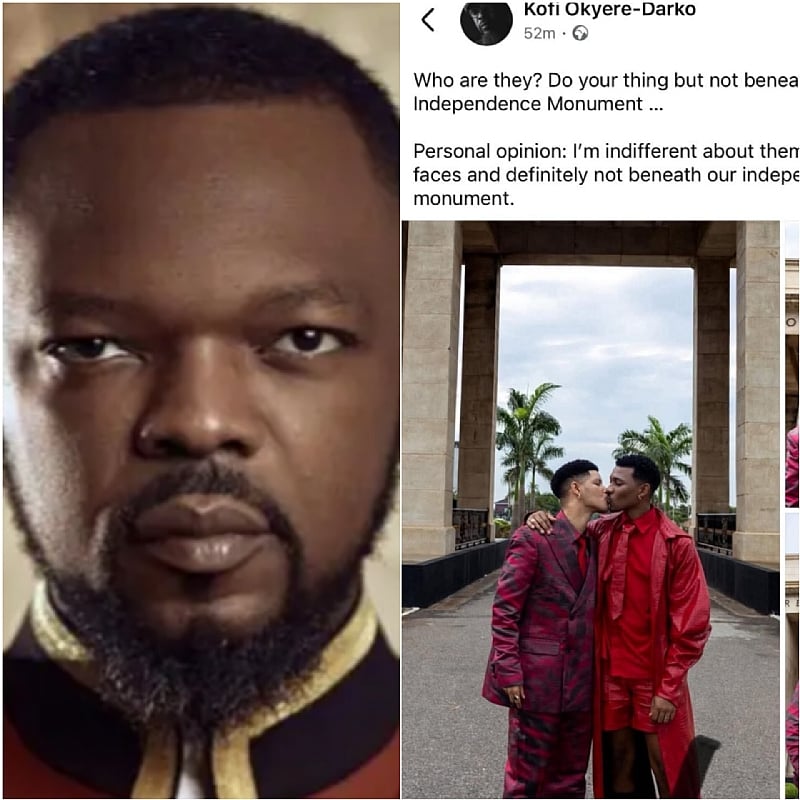Kofi Okyere Darko, widely recognized as KOD, a prominent Ghanaian media figure and Presidential Adviser on Diaspora Affairs, recently ignited a contentious debate with a social media post concerning the LGBTQ+ community. His statement, “Who are they? Do your thing but not beneath our independence monument,” has been interpreted by many as a veiled endorsement of LGBTQ+ rights while simultaneously cautioning against public displays related to sexual orientation, particularly at national landmarks like the Independence Monument. This seemingly ambivalent stance reflects the complex and often fraught relationship between Ghana and its LGBTQ+ citizens, a relationship characterized by deeply ingrained societal disapproval and legal non-recognition of same-sex relationships.
Ghana’s sociocultural landscape is largely shaped by conservative values, often rooted in religious doctrines, that view homosexuality as an aberration. This prevalent sentiment translates into widespread discrimination and marginalization of LGBTQ+ individuals, who often face social ostracization, harassment, and even violence. The legal framework further reinforces this discrimination, as the Ghanaian constitution does not acknowledge same-sex partnerships, and there are no legal protections against discrimination based on sexual orientation or gender identity. The absence of legal safeguards leaves LGBTQ+ individuals vulnerable and perpetuates a climate of fear and intolerance.
While various organizations and activists champion the cause of LGBTQ+ rights and strive to cultivate greater societal acceptance, their efforts often encounter substantial resistance. Conservative groups, often backed by religious institutions, actively campaign against LGBTQ+ rights and advocate for maintaining the status quo. This dynamic creates a tense atmosphere where progress toward inclusivity is slow and fraught with challenges. KOD’s post, therefore, landed in this already charged environment, further complicating the ongoing discourse.
The mixed reactions to KOD’s post mirror the societal divide on this issue. Some lauded his statement as a step towards greater tolerance, interpreting his words as an acknowledgment of LGBTQ+ individuals’ right to exist and express themselves, albeit with limitations. Others, however, criticized his seemingly ambiguous stance, accusing him of implicitly condoning homosexuality while simultaneously seeking to appease conservative sentiments by restricting public displays of affection or identity related to sexual orientation. This ambiguity, rather than clarifying his position, further fueled the debate, highlighting the difficulty of navigating this sensitive issue in the Ghanaian context.
Interestingly, KOD’s cousin, Gabby Asare Otchere-Darko, a prominent figure within the ruling New Patriotic Party (NPP), has previously spoken out against the hate campaigns targeting the LGBTQ+ community. His pronouncements underscored the importance of human decency and respect for all individuals, regardless of their sexual orientation. However, even within the ruling party, there is no unified stance on LGBTQ+ rights, reflecting the broader societal ambivalence. The ongoing debate underscores the complexities of reconciling deeply held cultural and religious beliefs with the principles of human rights and equality.
The LGBTQ+ community in Ghana faces significant challenges that extend beyond social stigma and legal non-recognition. Instances of violence, harassment, and discrimination are frequently reported, and individuals advocating for LGBTQ+ rights often face serious risks. A recent case involving the kidnapping of a prominent LGBTQ+ activist highlights the dangers inherent in publicly championing this cause. While there have been calls for the Ghanaian government to take more decisive action to safeguard the rights of its LGBTQ+ citizens, the issue remains politically contentious. The ongoing debate sparked by KOD’s post underscores the urgent need for a national conversation that addresses these complex issues and strives to find a path toward greater inclusivity and respect for all Ghanaians, regardless of their sexual orientation or gender identity. The challenge lies in balancing the need for protecting fundamental human rights with navigating the deeply ingrained societal and religious values that often clash with these principles. KOD’s post, while seemingly ambiguous, has nevertheless brought this critical issue back into the national spotlight, prompting further discussion and potentially paving the way for a more open and constructive dialogue about the future of LGBTQ+ rights in Ghana.


